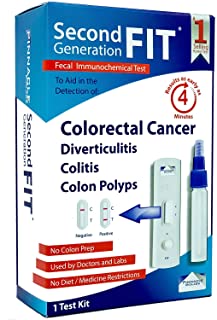Until recently, doctors in America urged most of their patients – starting at age 50 – to undergo a colonoscopy to detect colon cancer.
But that is no longer the case.
Many are now recommending that testing start at 45, unless a family history or health issue warranted a test at an earlier age. And there are good reasons why those much younger should take an inexpensive at-home test which one can buy for $24.99 on Amazon without a prescription.
Colon cancer is increasing in younger people.
“About 18,000 people under age 50 will be diagnosed with colorectal cancer in the U.S. this year—12% of total cases—and more than 3,600 of these patients are projected to die,” reports a recent article in YaleMedicine.
Gastro Center Of New Jersey said studies it has reviewed showed that “bowel cancer found in ages 20 – 30 rose between 1990 and 2016, increasing as much 7.9% per year between 2004 and 2016.”
At-home testing now being recommended
There is also a push by some doctors and insurers for patients to switch from colonoscopies to the simple, at-home, FIT (fecal immunochemical test) screening instead.
While all doctors agree that any colon cancer screening is better than none, there is a growing debate over whether colonoscopies, or the non-invasive FIT test, makes the most sense for those in the average risk group.
Colorectal cancer is the third most common cancer and the second most common cause of cancer deaths.
About 150,000 Americans get colon cancer every year and 50,000 die, most needlessly.
“Colon cancer has over a 90% survival rate when detected in early stages,” says Dr. Brian Cooley, a Texas gastroenterologist.
The debate between proponents of FIT and those that favor colonoscopies, may turn into a full-scale battle between some health insurance providers, who want to cut costs, and gastroenterologists, who perform the procedure, and stand to lose a lot of money.
Many industrialized countries, like Canada, Italy and the United Kingdom, with government paid health care, have been relying on FIT for years, which looks for tiny particles of blood in the stool.
The tests have been available in America for more than 10 years and unlike colonoscopies, don’t require unpleasant preparation or sedation.
The movement in America to switch to FIT took on more impetus following publication of a review of 31 studies that concluded the simpler FIT screening was at least as effective as colonoscopies. But ONLY if the test was taken annually for 10 years.
The pandemic also pushed more doctors to switch to FIT as few patients felt safe enough to go into hospitals or clinics for colonoscopies
The much quoted 2019 review unequivocally concluded that annual FIT testing should now be the gold standard.
“Our analysis finds that FIT is a good ‘pre-screening’ test for average risk, asymptomatic adults, saving them hassle and the U.S. healthcare system costs,” Dr. Thomas Imperiale, the lead author of the review, a gastroenterologist with IU School of Medicine and a research scientist with the Regenstrief Institute, told WebMD.
“We need to recognize that FIT is at least as good as colonoscopy,” Dr. James Allison said. He was the author of an accompanying editorial to the study, which said that most who had not yet been screened are poor or uninsured. He is also with the Kaiser Permanente Northern California Division of Research.
Some health insurance providers already require FIT.
Some American health systems and doctors are already pushing their patients with normal health risks toward FIT or Cologuard, a stool DNA test that in addition to blood, also detects some DNA mutations that may indicate cancerous or precancerous cells.
Major health systems like Kaiser Permanente and the federal Veterans Health Administration are requiring patients to take the FIT screening test instead of initially prescribing them colonoscopies.
Part of the reasoning is based on the fact that a third of Americans never get a colonoscopy. Besides lack of insurance, many don’t want to undergo the unpleasant preparation that requires a day of fasting and thorough cleansing – sitting on the toilet for hours. Some also don’t want to be sedated.
Is it about money?
Some proponents of at-home screening over colonoscopies say that gastroenterologists advocate for the invasive procedure because that is how they make their living.
“There’s a large financial incentive for people who do colonoscopies to do colonoscopies,” said Dr. James Goodwin, a geriatrician and researcher at the University of Texas Medical Branch in Galveston, in a January New York Times article that advocated for FIT screening.
As expected, gastroenterologists fired back at the NYT article and its sources.
“As with many lay media articles there are misleading statements because nuances are lost,” wrote Duke University Medical Doctor Deborah Fisher, in the March edition of Gastroenterology & Endoscopy News.
“While FIT is an important screening tool for colorectal cancer (CRC), the disparagement of colonoscopy is unwarranted,” wrote the president and president elect of American Society for Gastrointestinal Endoscopy.
Colon cancer, they pointed out, “has declined by 30% between 2000 and 2010, and the widespread use of colonoscopy is a major factor in this decline. When FIT is positive, patients must undergo colonoscopy, or the initial test is useless.”
“The only difference between someone living and dying from colon cancer is when — at what point in their life — they get their colonoscopy,” said Dr. Bruce Sand, an HonorHealth gastroenterologist. “Colonoscopy really can save your life.”
Anne Mongiu, MD, PhD, a Yale Medicine colorectal surgeon, agrees that home testing is better than no testing.
But she still advocates for colonoscopies.
“The main thing I stress is that home tests are really for detecting cancer—or early cancer—or maybe a large bleeding polyp,” she says in a recent article in YaleMedicine.
“Colonoscopy, on the other hand, not only looks for cancer, but it can also prevent cancer by removing polyps that, if left alone, could turn into a cancer. I tell my patients that a colonoscopy is like ‘yard maintenance,’ where the team comes out to not only examine the lawn, but also to spray all the weeds so they can’t grow up and ruin it.”
FIT has its drawbacks.
A single FIT test doesn’t find as many cancers as a colonoscopy.
It can result in false positive results – which still require colonoscopies. Some insurers then won’t pay for the full cost of a colonoscopy “because it would be considered diagnostic, not screening, at that point” says NortonHealthcare.
It also doesn’t find most polyps, which in three to 6% cases can become malignant.
Depending on the brand, according to WebMD, the 2019 mega-study showed that a single FIT screening “caught around three-quarters to 91 percent of colon cancers.”
Proponents of the FIT concede that it doesn’t find all the cancers. But they say it is a non-issue because in subsequent tests the cancer will be uncovered and it takes years for polyps to become malignant. Some doctors recommend that patients take two FIT tests, one soon after the other.
Insurer HealthPartners says that in 25% of the cases FIT will have a false positive result, which means that those people will need to have colonoscopies.
The insurer said said that a positive result may be because of “other issues (such as inflammation or hemorrhoids) causing blood to be present in the stool.”
Cologuard is the third option
Another screening that some doctors recommend is Cologuard, which costs about $500 and requires a doctor’s prescription. It is the best known test for colon cancer as it spends $100 million annually advertising the cute box. Insurers will pay for it once every three years. FIT however, is the most popular.

Cologuard, which is covered by Medicare, Medicare Advantage plans, some insurers and some state Medicaid programs, says it finds 92% of all cancers.
A 2014 study showed that about 13% of results from Cologuard were false positives and 8% were false negatives, the company says.
Colonoscopies are 95% accurate in finding cancerous polyps and have only a tiny chance of resulting in a false positive. If a polyp is found, it then becomes a positive test result and the polyp is removed during the colonoscopy. They cost as much as $3,000.
The bottom line is get screened for colon cancer.
I start my preparation Monday for my fifth colonoscopy. My doctors urged me to undergo the procedure every three years as non-cancerous polyps were found every time.
But this may be the last one for me as I’m almost 74, and the older you get the more chance for complications. Maybe next year I will simply buy FIT.


